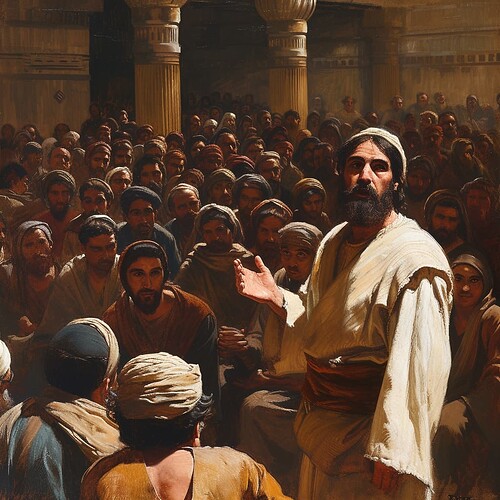 February 16th: Mark 12 - Encounters with Enlightenment
February 16th: Mark 12 - Encounters with Enlightenment
Unveiling Jesus’ Transformative Teachings
 Introduction
Introduction
In Mark 12, we are treated to a series of enlightening encounters between Jesus and various groups in Jerusalem. From these dialogues, we gain an understanding of the depth of Christ’s wisdom and the profound significance of his teachings.
 The Parable of the Wicked Tenants
The Parable of the Wicked Tenants
Jesus uses this potent parable to show his listeners how traditional religious leaders had rejected God’s messengers, and would even reject him, the Son. He impacts a deep lesson about the unfortunate consequences of such rejections.
![]() Mark 12:10 “Have you not even read this Scripture: ‘The stone that the builders rejected has become the cornerstone.'”
Mark 12:10 “Have you not even read this Scripture: ‘The stone that the builders rejected has become the cornerstone.'”
 Paying Taxes to Caesar
Paying Taxes to Caesar
When asked about paying taxes to Caesar, Jesus astutely recognizes the trap set for him by the Pharisees and Herodians. His response, that we must “Render to Caesar the things that are Caesar’s, and to God the things that are God’s,” draws a clear line between earthly obligations and spiritual ones.
![]() Mark 12:17 “Then Jesus said to them, ‘Give back to Caesar what is Caesar’s and to God what is God’s.’”
Mark 12:17 “Then Jesus said to them, ‘Give back to Caesar what is Caesar’s and to God what is God’s.’”
 Key Themes and Reflections
Key Themes and Reflections
Love Above All: In Mark 12, Jesus emphasizes love as the greatest commandment. Our responsibilities to God include loving God wholly with heart, mind, soul, and strength, and loving our neighbors as we love ourselves.
The Rejected Stone: The powerful image of the rejected stone becoming the cornerstone symbolizes Jesus’ story. His rejection led to the salvation of mankind.
 Today’s Application
Today’s Application
We can extract profound life wisdom from Mark 12. Above all, we should prioritize love for God and each other in our lives. We should also be mindful of not rejecting valuable lessons and messengers in our lives, like the builders in Jesus’ parable.
 Hidden Gems
Hidden Gems
Jesus’ encounter with the poor widow who gave all she had in offering shows that it’s not the size of our gift that matters, but the heart behind it. It emphasizes the importance of sincere sacrifice and selfless giving.
 Reflective Q&A
Reflective Q&A
![]() What does it mean to love God with all your heart, soul, mind and strength?
What does it mean to love God with all your heart, soul, mind and strength?
A: To love God completely, means dedicating every aspect of oneself, from emotions and desires to intellectual capabilities and physical actions, to honoring and serving God.
![]() Why is the widow’s offering more commendable when it was just two small copper coins?
Why is the widow’s offering more commendable when it was just two small copper coins?
A: The widow’s offering is greatly valued because she gave out of her poverty while others gave from their surplus. It shows her deep faith and commitment to God.
 Join the Discussion
Join the Discussion
Share your thoughts, reflections, or any new insights from today’s reading. We’d love to hear from you!
 See You Tomorrow in Mark 13
See You Tomorrow in Mark 13
Anticipate a prophetic journey as we delve into Christ’s foretelling of the end times and what it means for us today. Remember, love persists and transforms - no stone of wisdom is to be rejected.
